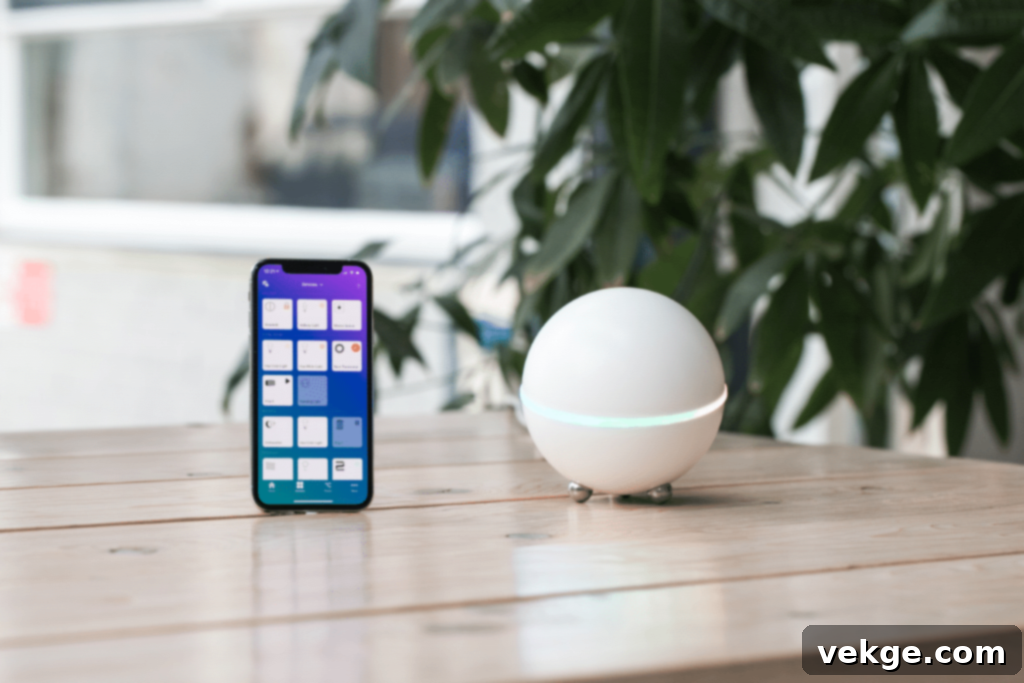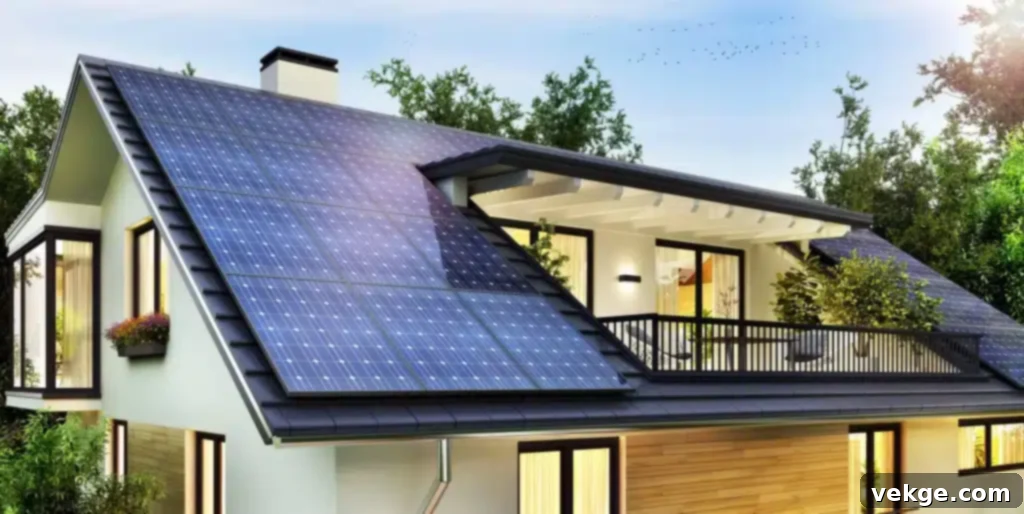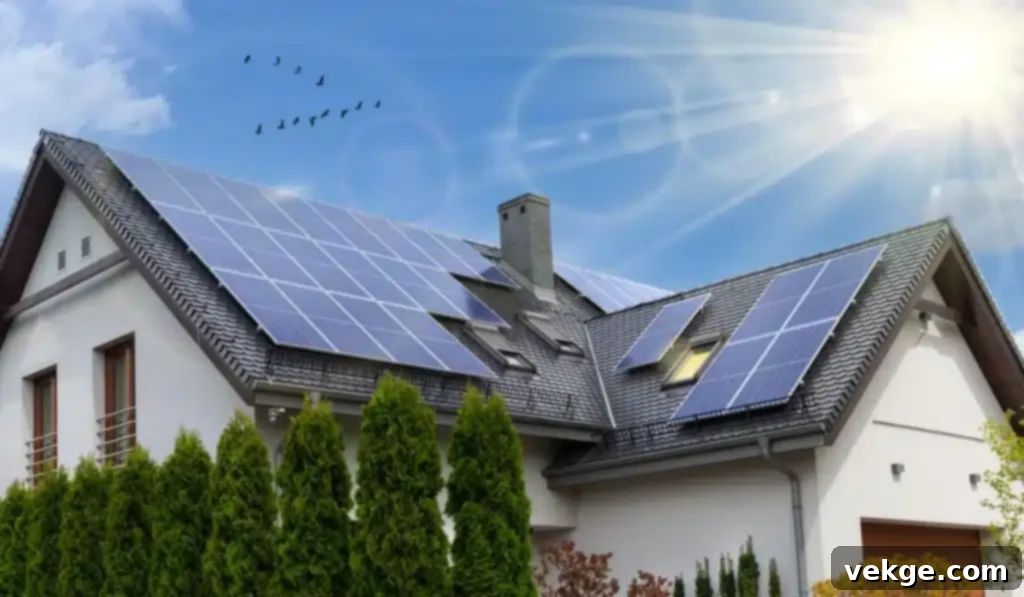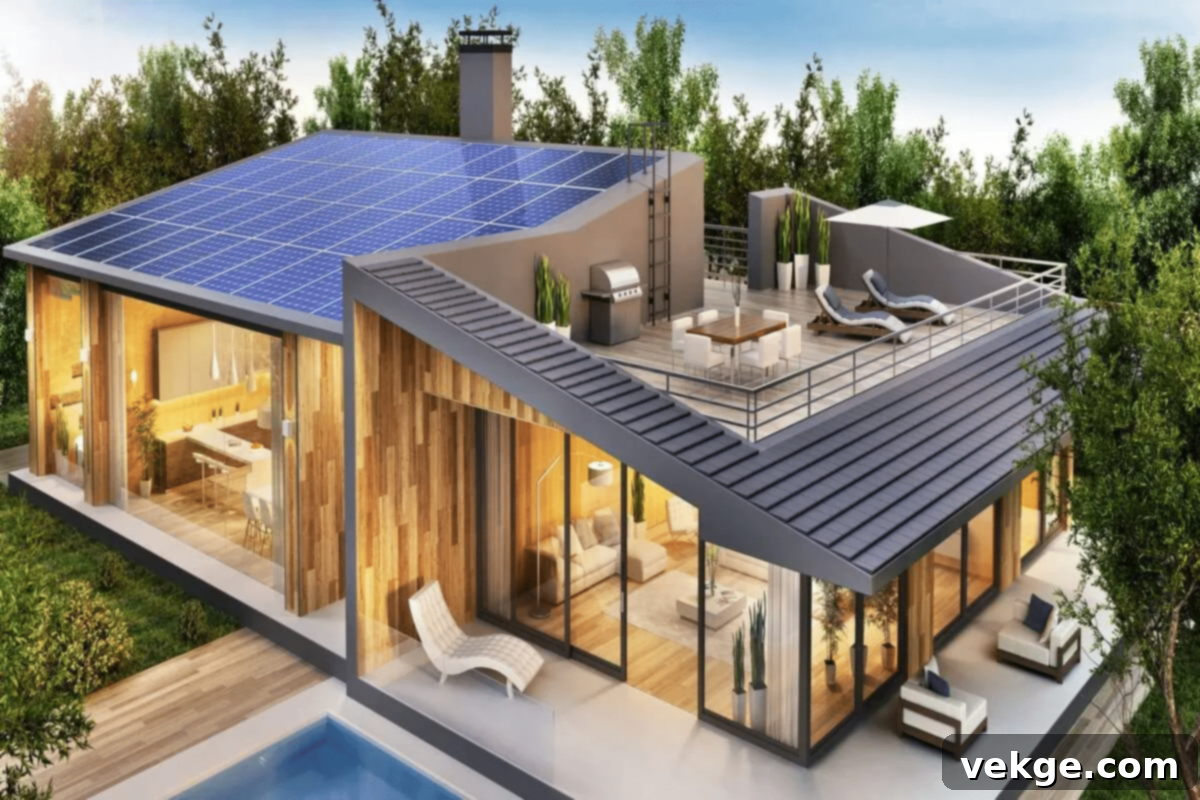The Future is Now: Unlocking Energy Efficiency and Automation with Solar-Powered Smart Homes
Smart homes are rapidly gaining popularity, transforming the way we live and interact with our personal spaces. This modern approach to living offers immense convenience, significant long-term savings, and a remarkably low energy footprint, especially when integrated with renewable energy sources like solar panels. The synergy between smart home technology and solar power creates an optimal environment for efficiency, sustainability, and enhanced comfort.
The core objective of combining these two powerful technologies is to simplify daily life, empower homeowners with greater control, and drastically reduce operational costs. Energy-efficient houses, powered by the sun and managed by intelligent systems, represent a burgeoning trend that is here to stay, reshaping the future of residential living.
Recent polls, such as those conducted by the National Association of Realtors, reveal a compelling shift in consumer demand: approximately 70% of clients are actively seeking homes that prioritize environmental friendliness and energy efficiency. This preference is driven by a desire for peace of mind, enhanced security regardless of location, unparalleled comfort and control, seamless process automation, substantial energy savings, and an overarching sense of safety. These benefits collectively make the solar-powered smart home an incredibly attractive proposition for contemporary homeowners.
As green energy continues to rise as a global priority, this article will delve deeper into the innovative world of smart homes equipped with solar systems, exploring how this powerful combination elevates the quality of life for its inhabitants and contributes to a more sustainable planet.
What Does a Smart Home Do?

At its core, a “smart home” embodies an advanced concept where various technologies collaboratively control and manage an entire residence or specific components within it. This intricate network links diverse systems and gadgets—such as lighting, heating, ventilation, air conditioning (HVAC), security cameras, door locks, and entertainment systems—to create a living environment that is safer, more comfortable, significantly more energy-efficient, and effortlessly manageable for its occupants. Smart homes leverage cutting-edge technologies like the Internet of Things (IoT), sophisticated sensors, AI-powered smart assistants, and robust automation systems to achieve this seamless integration.
The overarching purpose of these integrated systems is to streamline the operation and management of various household functions. For instance, the addition of solar screens for homes has become a popular enhancement within the solar smart home paradigm. When these technologies work in unison, they provide homeowners with unparalleled operational speed, optimal output, and a truly integrated living experience.
A significant advantage of adopting the smart home concept is its inherent adaptability and future-proofing. The underlying infrastructure allows for the continuous integration of new technological features and upgrades as they emerge. As technology evolves, life within a smart home becomes even more convenient, efficient, and enjoyable, ensuring your investment remains relevant and valuable for years to come.
Crucially, the successful implementation of a smart home hinges on meticulous planning and installation, adhering strictly to industry standards. This ensures that all components operate harmoniously and efficiently. Only through such precise integration can homeowners fully realize the intended benefits of enhanced control, efficiency, and comfort.
Why Solar Panels Are a Good Idea for A Smart Home
Integrating sustainable energy sources, particularly solar panels, is a perfect complement to the entire philosophy of a smart home. While smart homes inherently aim to save energy, enhance operational efficiency, and automate tasks, the inclusion of solar power takes these benefits to an entirely new level. A smart plug certainly contributes to an energy-efficient home, but the impact becomes profoundly more significant with the addition of solar energy.
Regardless of how sophisticated a smart home’s systems are, electricity remains its fundamental lifeblood. This electricity can be sourced in two primary ways. The first, traditional method, involves drawing power from a conventional grid, which often relies on fossil fuel power plants. These plants typically have a substantial carbon footprint due to the mining, burning, and transportation of resources required for energy generation and distribution. The second, and increasingly preferred method, is to derive power from clean, renewable energy sources, most notably solar photovoltaic cells.
Choosing solar energy means taking control of your power supply. This decentralized approach allows homeowners to generate their own electricity, fostering greater energy independence. Whether through installing your own panels, utilizing community solar farms, or engaging with local “solar companies near me” for direct energy supply, the power of the sun becomes a readily accessible and manageable resource.
Solar energy is a truly free, environmentally friendly, and inexhaustible resource. While the initial investment in solar panels can be substantial, they offer a remarkably fast return, especially when paired with a smart home system. Although the manufacturing process for solar panels has a small carbon footprint, their operational lifespan of 20 to 25 years (or more) ensures decades of clean energy production, significantly offsetting any initial environmental impact.
To further amplify your return on investment and enhance performance, consider adding a battery storage system to your smart home’s solar array. A smart home already excels at reducing energy consumption. With a battery, any excess solar energy generated during peak sunlight hours can be stored, ready for use when the sun isn’t shining, such as at night or on cloudy days. This eliminates reliance on the grid during off-peak hours and maximizes self-consumption of clean energy.
Furthermore, integrating critical home systems and devices directly with the battery can lower the overall load on your primary electrical panel, optimizing energy distribution. This flexible system allows for continuous adjustment and recalibration of all components to ensure maximum efficiency and responsiveness to your energy needs.
It’s also prudent to consider potential risks, such as grid outages or emergencies. Storing any surplus solar energy in a battery provides a reliable backup power source, offering peace of mind and resilience during unforeseen circumstances.
In essence, solar power provides free, manageable energy that enhances overall efficiency and unlocks advanced automation capabilities within a smart home. This truly embodies the concept of living intelligently and sustainably by harnessing the sun’s power.
Let’s illustrate with a practical example of how solar panels and a smart home can collaborate to achieve significant savings. Imagine you want to run your laundry without incurring electricity costs. A conventional washing machine cannot achieve this independently. However, within a solar-powered smart home, you can configure the system to automatically activate the washing machine during peak daylight hours when your solar panels are generating abundant energy. This ensures your laundry is “free” in terms of electricity costs.
Moreover, you can program devices to utilize the stored battery power. For instance, you could set your washer to start only when the battery charge exceeds a predetermined threshold, ensuring you always prioritize self-generated clean energy before drawing from the grid or depleting your backup supply.
Pros of Smart Homes That Use Solar Energy

The combination of solar energy and smart home technology offers an unparalleled opportunity to control and optimize a home’s energy consumption. Their tandem operation yields a multitude of significant benefits, making solar-powered smart homes a compelling choice for modern living:
- Environmental Stewardship: Solar-powered smart homes primarily utilize clean, renewable energy. This dramatically reduces reliance on fossil fuels, leading to a substantial decrease in carbon emissions and a positive impact on environmental health. By contributing to the fight against climate change, homeowners play an active role in creating a greener, more sustainable future.
- Long-Term Financial Savings: While the initial investment in solar panels and a smart home system might seem considerable, the long-term financial returns are immense. Homeowners can experience significantly reduced or even eliminated electricity bills, especially when combined with net metering programs where excess energy can be sold back to the grid. Over time, this investment effectively pays for itself, yielding substantial savings for decades.
- Increased Home Value and Incentives: Homes equipped with solar panels and smart technology are increasingly attractive to potential buyers, commanding higher resale values. Furthermore, the installation of renewable energy sources often qualifies for various tax breaks, rebates, and incentives at federal, state, and local levels, further offsetting initial costs and accelerating the payback period.
- Optimal Energy Management: Smart home automation and advanced energy management systems continuously monitor and regulate energy usage across all appliances and devices in real-time. This intelligent oversight ensures that energy is consumed as efficiently as possible, minimizing waste and optimizing the overall energy economy of the household.
- Enhanced Energy Independence and Resilience: Smart homes frequently incorporate energy storage systems, such as batteries, to capture and store excess solar energy generated during the day. This stored energy provides a continuous power supply even when the sun isn’t shining, offering true energy independence and robust backup during grid outages or emergencies, thus enhancing household security and peace of mind.
- Unparalleled Comfort and Convenience: Beyond savings, smart homes offer an elevated level of comfort and convenience through automation. From climate control that adapts to your presence to intelligent lighting and remotely managed security systems, the integration with solar power ensures these comforts are delivered efficiently and sustainably.
These key advantages are just a glimpse into the myriad reasons why transitioning to solar-smart living is a wise and beneficial decision for the future.
How Solar Panels Make Smart Homes More Energy Efficient and Provide More Automation

Solar panels significantly enhance both smart home automation and overall energy efficiency in several transformative ways:
- Reduced Grid Dependence: Installing solar panels for houses drastically reduces reliance on the conventional power grid. By generating clean, renewable solar energy directly on-site, less stress is placed on the main utility infrastructure, and homeowners gain greater control over their energy supply, achieving a higher degree of energy independence.
- Substantial Reduction in Energy Bills: The ability of solar panels to generate electricity can dramatically lower, or even eliminate, monthly energy bills. Smart homeowners can harness this free, abundant solar energy to power a wide array of household electronics and appliances, leading to substantial financial savings over the system’s lifetime.
- Automatic Energy Management and Optimization: In a smart home, intelligent control systems seamlessly integrate with solar panels to dynamically regulate electrical consumption in real-time. For example, the system can automatically adjust appliance schedules, activate energy-saving modes, or manage power consumption based on the real-time availability of solar energy. This ensures that energy-intensive tasks are prioritized when solar production is highest, maximizing efficiency.
- Dynamic Load Control Based on Solar Output: Smart home systems can intelligently control various loads within the home based on current solar energy production. High-consumption devices like air conditioners, electric vehicle chargers, or water heaters can be programmed to switch on or increase their activity when home solar panels are generating surplus power. This strategic consumption ensures that more self-generated solar energy is utilized, further reducing the need to draw power from the grid.
- Real-Time Energy Tracking and Analysis: Advanced smart home systems provide homeowners with detailed, real-time tracking and analysis of energy generation and consumption. This comprehensive data allows occupants to see exactly how much energy is being produced by their solar panels, how much is being consumed by individual devices, and identify areas for further optimization. Armed with this information, homeowners can make informed decisions to lower energy bills and enhance overall household energy efficiency.
Regardless of the size of the solar installation, the amount of power consumed, or local energy rates, a solar-powered smart home, with its highly efficient integrated systems, proves to be remarkably cost-effective. To gain a precise understanding of potential savings and available incentives tailored to your specific situation, consulting with experienced solar experts and conducting a personalized cost-benefit analysis is highly recommended.
Conclusion
Integrated solar homes represent a pivotal convergence of modern technology, seamlessly blending renewable energy generation with advanced home control systems. These innovations are not merely conveniences; they are crucial steps forward in addressing global warming and significantly enhancing the quality of life for individuals and communities worldwide. By embracing these technologies more widely, we can pave the way for a smoother, more sustainable, and automated future.
There should be no doubt that the best solar panels are instrumental in making a smart home exceptionally efficient and highly automated. The time to integrate these two powerful tools for a smarter, greener, and more economical lifestyle is now. Embark on your journey to sustainable living today.
